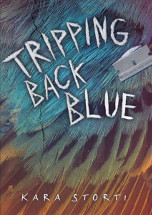Tripping back blue by Kara Storti

Carolrhoda Lab, 2016. ISBN 9781512403084
(Age: Older teens) Illegal drugs. Family violence. Twins.
Being a small scale drug dealer is dangerous but Finn is smart and
careful, he enjoys the excitement and he is doing it for a good
cause. Finn and his twin sister Faith live in a trailer park in
Dammertown. It is their graduation year, a critical time with the
chance to escape to college. Faith, who lost an eye in one of their
father's drunken rages, is such a good student she has qualified for
Harvard but won't be able to afford it even with a scholarship.
Finn, who feels responsible for her lost eye, intends saving enough
money from dealing drugs to pay for her education. In escalating his
drug dealing he increases the risk and stress which he manages with
his own increasing use of drugs, mirroring his mother's use of
antidepressants and his father's use of alcohol. His escape from it
all is birdwatching in the local cemetery where he meets an old
lady with a common interest in birds and access to a wonder drug
which seems to take the user back to their best memory with a
lasting euphoria and no after effects. Better still it is so unknown
it is not illegal and Finn comes to an arrangement where he is given
access to the drug he calls Indigo in exchange for spending time
with the old lady who turns out to be the grandmother of the new
girl at school, the daughter of a cop who chases drug dealers. From
this point the story focuses on their relationship and Finn's
complicated schemes for marketing the new drug, avoiding the big
dealers who have become interested in controlling it and
acknowledging his own dependence on drugs. The pace picks up and
there is an exciting climax at a cabin in the woods and a final
grappling with the challenges of the future but it seemed too little
too late and I am not sure too many of the older teen readers, who
might be drawn to read this novel because of its illicit drug
appeal, would stick with the rather drawn out story development to
enjoy the exciting but abrupt end. It was a depressingly believable
and explicit account of the rationalizing around drug use and the
'live in the now' escapism which replaces ambition.
Sue Speck